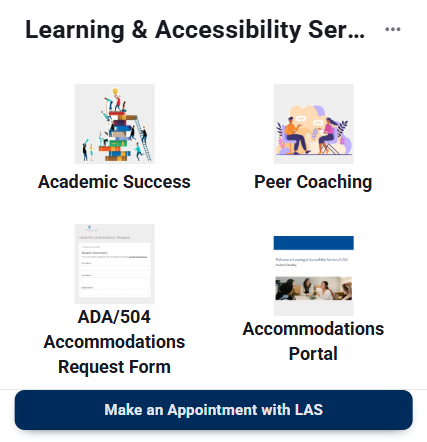Content being updated
How to Request Accommodations
ADA/504 Accommodations are intended to break down barriers students may face inside or outside the classroom due to disability. We work individually with students to identify those disability-related barriers and which accommodations would be most effective.
First-time Requesting?
Request accommodations for the first time by completing the Initial Accommodations Request Form. The form does allow you to attach documentation, though it is not required to successfully submit the form. You are welcome to review our Documentation Guidelines if you have questions about the role of documentation in the accommodations process.
Additional/Supplemental Request?
If you already have approved ADA/504 accommodations, please complete a Supplemental Request if you are seeking any additional accommodations.
Access your Accommodations Profile by logging into your Wheaton Gateway. You should see a "widget" for LAS. Click on the picture for Accommodations Portal. Once in the portal, your Accommodations menu is on the left and you can navigate to Supplemental > Add New.

After submitting an Initial or Supplemental Request...
LAS will reach out via email to prompt you to schedule a meeting via our online booking platform. Typically, that meeting will be necessary to ensure LAS has all the information they need. If accommodations are approved, those accommodations will be sent to your current semester professors or relevant parties across campus, as you request.
The accommodations process is dynamic and interactive and involves collaboration between the student, the faculty member, Learning and Accessibility Services, and, in some cases, other relevant parties. The application of certain academic accommodations may look different, depending on the course. While accommodations may constitute adjustments to a course, they are not intended to fundamentally alter learning outcomes or excuse a student any course requirements.
Attendance & Extensions Accommodations
Attendance
If a student is approved for an ADA Accommodation related to class attendance, it is because their disability may occasionally impact their overall attendance throughout the course of the semester. Attendance accommodations are highly contextual and course-specific, so the following guidelines have been developed to promote clarity and a smooth application of such accommodations:
- Student and faculty are encouraged to collaborate and meet about how this accommodation will be applied in their course. LAS is happy to be a part of those conversations and may be invited to participate by either the student or faculty, as needed.
- Student will inform faculty when attendance accommodation needs to be used. No personal disability or health related information needs to be shared. Student can simply state, “I need to use my attendance accommodation for class today.” Faculty should not ask student to present medical/health documentation when an accommodation has already been approved.
- If student is not comfortable speaking directly to faculty to inform them of their absence, they may reach out to LAS to act as a liaison.
- If a student is seeking an attendance accommodation after they have already had multiple absences due to disability, it is important to know that accommodations are not applied retroactively.
- Professor and student are encouraged to consider the total number of absences from the semester when assessing the student’s ability to meet course requirements.
- An attendance accommodation does not mean that a student can miss as many classes as they need; even with the application of an accommodation for attendance, the student may not be able to meet course requirements given the amount of in-class time they have missed. Again, this is very course-specific.
Extensions on Assignments
If a student is approved for an ADA Accommodation related to extensions on assignments, it is because their disability will occasionally impact their ability to complete assignments on time. This accommodation is typically approved in cases where a student’s disability may flare-up unpredictably throughout the semester. Extensions on assignments accommodations are highly contextual and assignment-specific, so the following guidelines have been developed to promote clarity and a smooth application of such accommodations:
- This accommodation is not applicable in cases where the late assignment is due to negligence or poor planning on the part of the student.
- Extensions and new due dates for assignments should be determined through a collaboration between the student and professor with as much advance notice as possible (ideally a week or more). Some assignments may not be able to be extended.
- Student is encouraged to initiate this communication by informing a professor that they need to utilize their accommodation for extensions on assignments and seeking an agreement on a new due date. Professor can also initiate this communication. LAS is available to liaise by request of student or professor.
- Professor and student may reach out to LAS in cases where it is unclear what that extension should be or if other guidance is needed.
- If an accommodation for extensions results in assignments being turned in after the end of the semester, student would need to seek an Incomplete through the Registrar’s process prior to end of the semester.